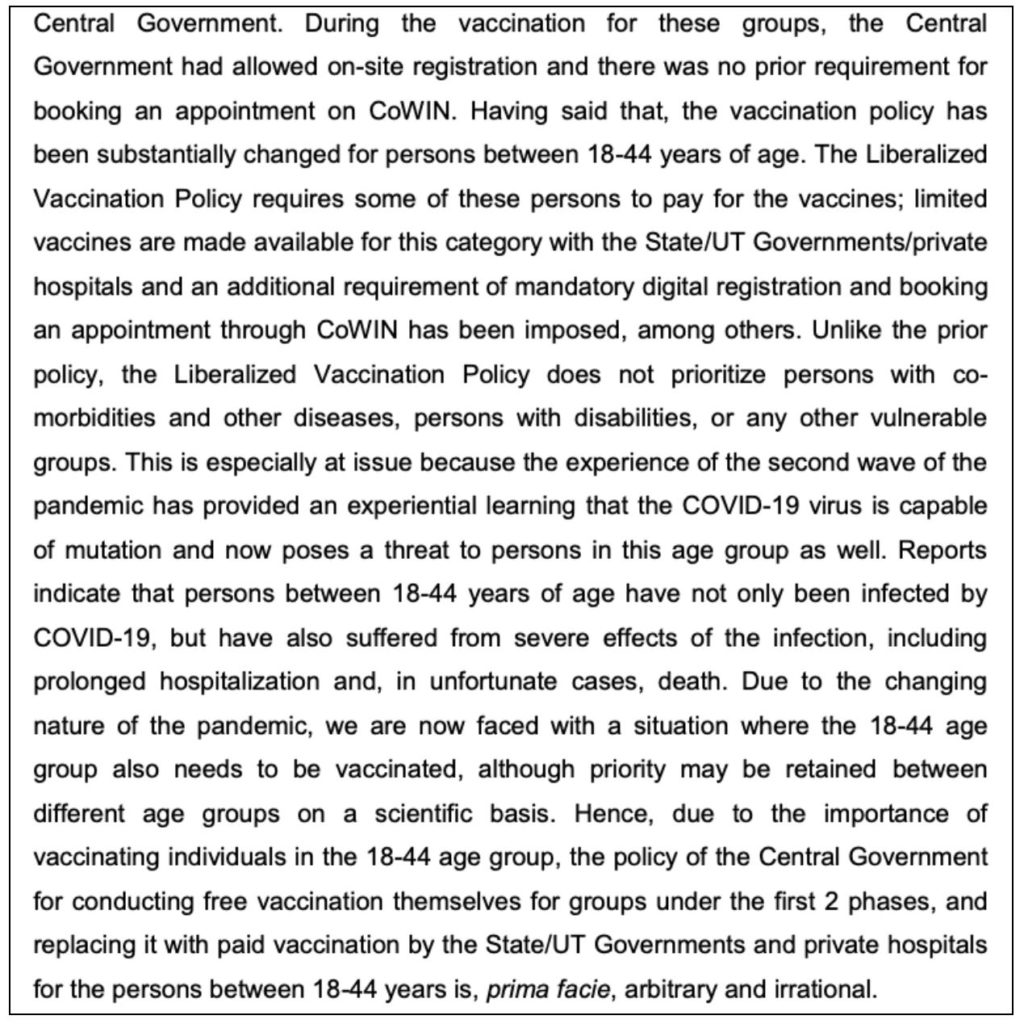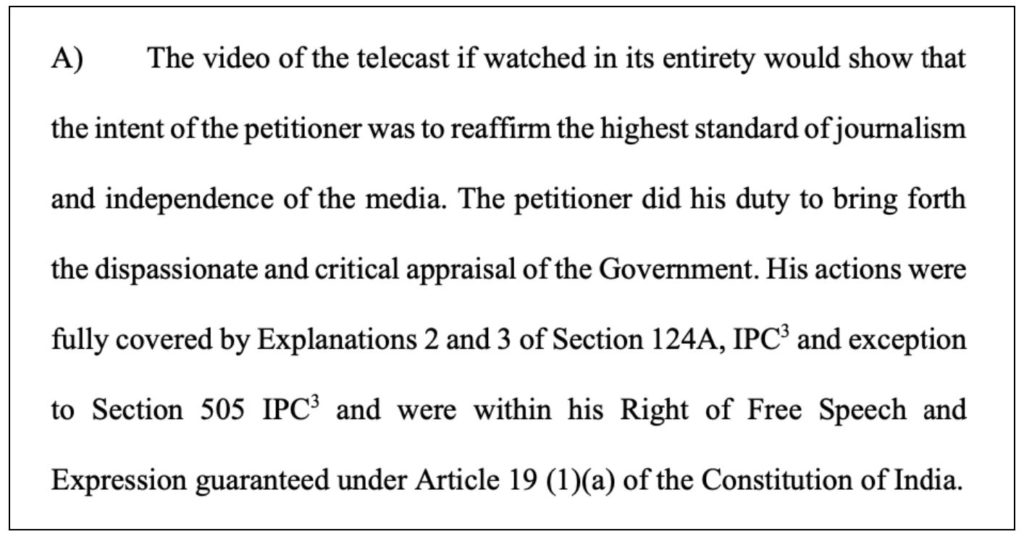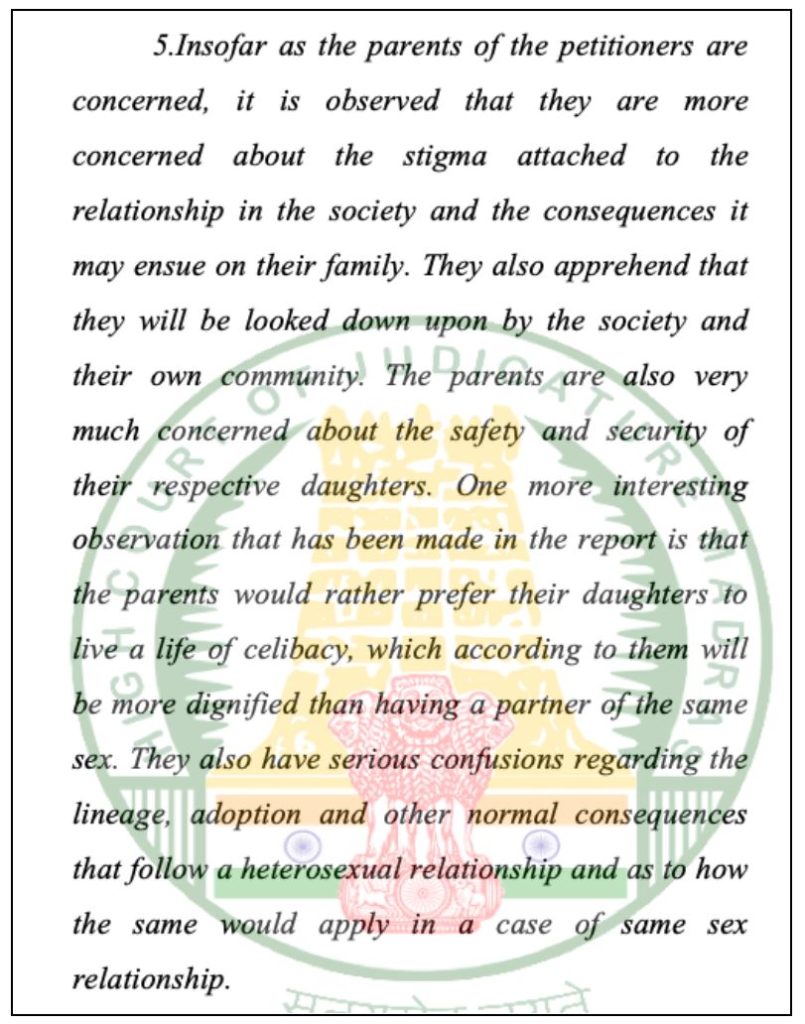In this roundup of court judgements, we look at Constitutional Courts’ remarks & directions on pricing and procurement policy of COVID vaccines adopted by the Central Government, freedom of speech and expression, and guidelines against police harassment of LGBTQIA+ persons.
Supreme Court: Directed Centre to undertake a fresh review of its vaccination policy
In suo moto proceedings regarding the distribution of essential supplies and services during the pandemic, the Supreme Court (SC) posed several questions on the rationale of the dual pricing and procurement policy of COVID-19 vaccines adopted by the Central Government.
The judgment starts with highlighting the fact that health experts globally agree that vaccination of the nation’s entire eligible population is the singular most important task in effectively combating the COVID-19 pandemic in the long run. From 1978 till 01 May 2021, the Union of India (UoI) has implemented the Universal Immunization Programme under which essential vaccines were procured by the UoI and were distributed to States/UTs free of cost for administering them to the end beneficiary. The said policy has held the test of times. Even during the vaccination drive for COVID-19 in phases 1 and 2 for vaccination of healthcare workers, frontline workers and persons above the age of 45 years, the UoI procured all the vaccines and distributed them to State/UT Governments for administration. The single procurement model has also been followed by other nations for ensuring fast and effective administration of vaccines against COVID-19.
The Universal Immunization Programme has been replaced by the ‘Liberalized Pricing and Accelerated National COVID-19 Vaccination Strategy’ from 01 May 2021 in phase 3 of the vaccination drive, whereby State/UT Governments or private hospitals are required to procure vaccines for persons between the age group of 18-44 years from the private manufacturers on the basis of a pro-rata quota i.e., 50:25:25 (UoI, State government, Private Hospitals) set by the UoI.
The judgement notes that persons between 18-44 years of age have not only been infected by COVID-19 but have also suffered from severe effects of the infection, including prolonged hospitalization and death. Hence, due to the importance of vaccinating individuals in the 18-44 age group, the policy of the Central Government for conducting free vaccination themselves for groups under the first 2 phases, and replacing it with paid vaccination by the State/UT Governments and private hospitals for the persons between 18-44 years is, prima facie, arbitrary and irrational.
The court also observed that many State/UT Governments and local municipal bodies have issued tenders and attempted to negotiate with foreign manufacturers, but they have largely been unsuccessful, as foreign manufacturers are not inclined to negotiate with individual State/UT Governments and prefer negotiating with federal governments of countries. Additionally, it has been indicated Central Government is better placed to use its monopoly as a buyer (India being the second most populous country) to bargain for higher quantities of vaccines at reasonable prices.
The court noted that the end result of the ‘Liberalized Vaccination Policy’ is that the UoI can purchase vaccines at Rs. 150 per dose for Covishield and Covaxin, while the State/UT Governments have to pay Rs. 300 and Rs. 400 per dose respectively. If the UoI were to be the single procurement agency for all vaccines at a fixed cost, then the cost of vaccination to the public exchequer would be substantially lower.

Further consequences of the vaccination by private hospitals, the supreme court highlighted, is that they may sell the vaccine doses procured at a higher price unless regulated stringently. Private hospitals also may not sell all their vaccine doses publicly through appointments on CoWIN, but rather sell them for lucrative deals directly to private corporations who wish to vaccinate their employees. Finally, private hospitals are not equally spread out across a State/UT and are often limited to bigger cities with large populations. As such, a larger quantity will be available in such cities, as opposed to the rural areas.
The court also notes that the facility of only online appointments on the CoWIN portal was initially introduced for the entirety of the population between the ages of 18-44 years. Later, on 24 May 2021, the UoI announced that on-site registration will be made available for the 18-44 years age group. However, this is contingent on: (i) the State/UT Government enabling this policy; and (ii) only in cases of wastage at a particular government COVID-19 vaccination centre due to a no-show by an online appointee. Further, this facility has not been expanded to private COVID-19 vaccination centres.
The court notes that the present system of allowing only digital registration and booking of appointments on CoWIN, coupled with the current scarcity of vaccines, will ultimately ensure that initially all vaccines, whether free or paid, are first availed by the economically privileged sections of the society. Any calculations of the economic ability of a given individual may not directly correspond to the vaccination route (paid/unpaid) they opt for. As such, even those who may have been able to afford a vaccine may opt for a free vaccine simply because of issues of availability, even if it would entail traveling to far-flung rural areas, as highlighted by recent news reports.
The judgement mentions statistics from a survey on “Household Social Consumption: Education” conducted by the National Statistics Office (July 2017-June 2018) and Telecom Regulatory Authority of India’s report titled “Wireless Data Services in India” (2020) to establish that there exists a digital divide in India, particularly between the rural and urban areas. The extent of the advances made in improving digital literacy and digital access falls short of penetrating the majority of the population in the country. On centre’s clarification that all gram panchayats in the country have Common Service Centres (CSCs) which can effectively enable people residing in rural areas to register online for the vaccination, the apex court takes note of the ‘Annual Report of CSC’ for 2019-20, which highlights that there are 2,53,134 Gram Panchayats in India, and as on 31 March 2020, only 2,40,792 Gram Panchayats are covered with at least one registered CSC. Hence, approximately 13,000 Gram Panchayats in India do not have a CSC.
Therefore, the apex court held that a vaccination policy exclusively relying on a digital portal for vaccinating a significant population of this country between the ages of 18-44 years would be unable to meet its target of universal immunization owing to such a digital divide. It is the marginalized sections of society that would bear the brunt of this accessibility barrier. This could have serious implications on the fundamental right to equality and the right to health of persons within the above age group.
In the light of the above observations, the court directed the UoI to undertake a fresh review of its vaccination policy and to provide a series of clarifications. Some of them include:
- A roadmap of projected availability of vaccines till 31 December 2021.
- The complete data on the Central Government’s purchase history of all the COVID-19 vaccines to date.
- The preparedness with respect to specific needs of children in the event of a third wave of the pandemic in terms of medical infrastructure, vaccination trials and regulatory approval, and compatible drugs.
- Whether under the policy of the UoI, it is permissible for State/UT Governments or individual local bodies to access vaccine supplies of foreign manufacturers.
- The number of crematorium workers vaccinated in phase 1 and if a targeted drive can be conducted for vaccination of the remaining crematorium workers.
- The State/UT Governments are diverting the vaccines (procured by them at a higher price than Central Government) for the persons in the age group of 18- 44 years to vaccinate persons above 45 years of age, due to a shortage of vaccines being supplied by the Central Government. The manner in which the Central Government will factor this quantity and price differential into their subsequent allocation and disbursal of vaccines.
- The mechanism for redistribution, if the 25:25 quota in a particular State/UT is not picked up by the State/UT Government or the private hospitals.
- The manner in which the Central Government will monitor the disbursal of vaccines to private hospitals, specifically those who have hospital chains pan India. Further, whether (i) private hospitals are liable to disburse vaccines pro-rata the population of States/UTs; and (ii) the mechanism to determine if private players are genuinely administering the lifted quota in that State/UT alone.
- Whether the Central Government conducted a “means-test” of the demographic of a State/UT to assert that 50% of the population in the 18-44 age group would be able to afford the vaccine. If not, the rationale for private hospitals being provided an equal quota for procurement as the State/UT Governments.
- The manner in which the Centre and States/UTs shall ensure an equitable distribution of vaccines across sections of the society, and how this factors into the rationale of equal apportionment between State/UT Governments and private hospitals.
- The Union Budget for Financial Year 2021-2022 had earmarked Rs. 35000 crores for procuring vaccines. How these funds have been spent so far and why they cannot be utilized for vaccinating persons aged 18-44 years?
Following these observations by the court, Prime Minister Narendra Modi announced that the UoI will procure 75% of the vaccines being produced by the manufacturers in the country and will be provided free of cost to people. In other words, the UoI will take back the task of procuring the 25% earlier earmarked for States/UTs. Private Hospitals can buy 25% of the monthly production from vaccine manufacturers. The UoI released revised guidelines on 08 June 2021 and these would come into effect from 21 June 2021.
Supreme Court: Every Journalist entitled to protection of the Kedar Nath Singh judgement
In the case Vinod Dua vs. Union of India, the Supreme Court quashed FIR against Journalist Vinod Dua for sedition and other offenses and upheld the principles laid down in the Kedar Nath Singh judgement.
The court was hearing a challenge to an FIR filed against Vinod Dua under provisions of the Indian Penal Code for offenses of sedition, public nuisance, printing defamatory materials and public mischief by BJP leader Shyam at Kumarsain police station in Shimla district on 06 May 2020. The charge is that on 30 March 2020, Vinod Dua in his YouTube show, stated that Narendra Modi has used deaths and terror attacks to garner votes, along with other statements on the ineffective management of the COVID-19 pandemic. On 06 October 2020, a bench of Justices U U Lalit and Vineet Saran had reserved the judgment, after hearing arguments for Dua, Himachal Pradesh government and the complainant in the case.
In the present hearing, the apex court observed that as a journalist, the petitioner was entitled to and did nothing more than critical analysis of the functioning of the Government. After examining all submissions, the court noted that Dua’s remarks were certainly not made with the intent to incite people or showed a tendency to create disorder or disturbance of public peace. The petitioner was within the permissible limits laid down in the decision of the SC in the Kedar Nath Singh judgement. In this case, the Supreme Court had read down Section 124A IPC and held that the application of the provision should be limited to “acts involving intention or tendency to create disorder or disturbance of law and order; or incitement to violence”.
Therefore, the principles culled out in the Kedar Nath Singh judgement show that a citizen has a right to criticize or comment upon the measures undertaken by the Government and its functionaries, so long as he does not incite people to violence against the Government established by law or with the intention of creating public disorder.

The court noted that the offences in the FIR are not made out at all and any prosecution in respect thereof would be violative of the rights of the petitioner guaranteed under Article 19(1)(a) of the Constitution.
In conclusion, the court quashed the FIR lodged against senior journalist Vinod Dua for sedition and other offences. The bench, however, refused the second prayer made by Vinod Dua seeking the formation of a committee to verify allegations against journalists before lodging FIR and that no FIR should be registered against a journalist with experience over 10 years unless cleared by the committee. The court observed that this prayer would be an encroachment into the legislative domain.
Madras HC: Guidelines against police harassment of LGBTQIA+ in missing complaints lodged by parents.
In the case of S. Sushama and another v Commissioner of Police and others, the high court issued a slew of guidelines to ensure that LGBTQIA+ persons are not harassed by police in missing complaints lodged by their parents.
The court was hearing a writ petition filed by two lesbian women against police harassment in a missing person complaint lodged by their parents, who did not approve of their relationship. The case has brought to light an important issue requiring de-stigmatization and acceptance in the eyes of the society. The bench of Justice Anand Venkatesh, therefore, consciously and voluntarily underwent psycho-educational sessions and interactions with LGBTQIA+ people to have a better understanding of their emotions and problems. He also admitted his “pre-conceived notions” about same-sex relationships and explained the educative processes undertaken by him to overcome inherent prejudices and biases against them.

Consequent to the previous order in April 2021, the parents of the couple each attended counselling sessions and a report was submitted to the court, highlighting the following:
- Parents of both the petitioners feel a great amount of shame, fear and social disdain for them because of their respective daughter’s homosexual relationship.
- Both parents expressed exhaustion in dealing with the litigation. They also expressed concern over the safety, security and future of their children.
Justice Venkatesh expressed that the change must take place at a societal level and when it is complemented by law, there will be a remarkable change in the outlook of the society towards same-sex relationships. The judgement mentions how legislative interventions are changing the attitude towards persons with disabilities and mental illness. The court called for similar legislative interventions with respect to the LGBTQIA+ community to eradicate the social discrimination against the community and to ensure the protection of their life and dignity.
The judgement refers to the principles laid down in Navtej Singh Johar v. Union of India, where it was held that homosexuality is neither unnatural nor is it a “mental disorder or a disease”. The judgement also notes that global jurisprudence on sex, sexual orientation and gender identity has witnessed a sea change.
The Court issued the following interim guidelines/directions for proper recognition of the rights of the LGBTQIA+ community and to ensure their safety and security:
- The police, on receipt of any complaint regarding girl/woman/man missing cases which upon enquiry/investigation is found to involve consenting adults belonging to the LGBTQIA+ community, shall upon receipt of their statements, close the complaint without subjecting them to any harassment.
- The Ministry of Social Justice & Empowerment (MSJE), has to enlist Non-Governmental Organizations (NGOs) including community-based groups which have sufficient expertise in handling the issues faced by the LGBTQIA+ community. The list of such NGOs along with the address, contact details, and services provided shall be published and revised periodically on the official website. Such details shall be published within 8 weeks from the date of the order.
- Any person who faces an issue for the reason of their belongingness to the LGBTQIA+ community may approach any of the enlisted NGOs for safeguarding and protecting their rights.
- The concerned NGO in consultation with the MSJE shall maintain confidential records of such persons who approach the enlisted NGOs and the aggregate data shall be provided to the concerned Ministry bi-annually.
- Such problems shall be addressed with the best-suited method depending on the facts and circumstances of each case be it counseling, monetary support, legal assistance with the support of District Legal Services Authority, or coordination with law enforcement agencies about offenses committed against any persons belonging to the LGBTQIA+ community.
- With the specificity of the issue of accommodation, suitable changes are to be made in existing short stay homes, Anganwadi shelters, and “Garima greh” (shelter home for transgender persons) with basic amenities like shelter, food, medical care and recreational facilities. Besides, it shall provide support for capacity-building/skill development of persons in the community, which will enable them to lead a life of dignity and respect. These must accommodate any and every member of the LGBTQIA+ community, who require shelters and/or homes. The MSJE shall make adequate infrastructural arrangements in this regard, within a period of 12 weeks from the date of the order.
- Such other measures that are needed for eliminating prejudices against the LGBTQIA+ community, and channelizing them back into the mainstream shall also be taken up. The Union and State Governments respectively, in consultation with such other Ministries and/or Departments shall endeavour to the device such measures and policies.
- For the sake of creating awareness, the Court also suggested a number of sensitization programs to be conducted by the concerned Ministry of the Union/State Government(s) for police force, legal authorities, judiciary, etc.
The court emphasized that it expects the respective departments/authorities and institutions to implement these guidelines in letter and spirit, not for the sake of complying with a judicial fiat but to ensure that this society evolves, and the LGBTQIA+ community is not pushed out of the society.
Featured Image: Important Court Judgements


